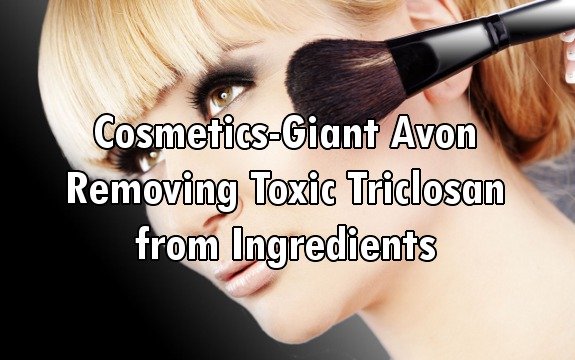Cosmetics-Giant Avon Removing Hormone-Disrupting Triclosan from Ingredients

 Cosmetics-giant Avon announced recently they would be removing the chemical triclosan from their products in coming months. The proven hormone-disruptor is commonly found in cosmetics and products labeled as anti-bacterial, but a growing consumer awareness is leading companies to seek alternatives.
Cosmetics-giant Avon announced recently they would be removing the chemical triclosan from their products in coming months. The proven hormone-disruptor is commonly found in cosmetics and products labeled as anti-bacterial, but a growing consumer awareness is leading companies to seek alternatives.
“We are not going to use it in new products and the process is underway for identifying alternatives or changing formulations for the small number of existing products that had included triclosan among their ingredients,” said Jennifer Vargas, Avon spokeswoman, to the Guardian.
Avon cites consumer concern for their change of tune. They join other companies like Procter & Gamble, Jonson & Johnson, and Colgate-Palmolive in phasing out the chemical.
Triclosan is a known hormone and thyroid disruptor. But it’s also been linked to increased allergic reactions and compromised immunity – just some of triclosan dangers.
Because studies have found it to “amplify the effects of sex hormones”, it’s believed the compound could increase your risk of breast and prostate tumors, which is particularly interesting considering Avon’s highly-visible ties to pink-ribbon marketing and vocal breast-cancer awareness campaigning.
The Campaign for Safe Cosmetics says that Avon needs to quit playing “catch-up” to other companies in regards to unsafe chemicals in their products.
“The Campaign for Safe Cosmetics congratulates Avon for finally giving triclosan the boot,” said co-founder Janet Nudelman in a statement. “It’s a hormonally active chemical that has no business being in cosmetics and personal care products.”
“But triclosan is just the tip of the iceberg when it comes to unsafe chemicals in cosmetics. We want Avon to adopt a comprehensive policy that declares chemicals linked to cancer, birth defects, and other adverse health effects to be off limits in cosmetics and to support stricter regulation of the $71bn cosmetics industry so that everyone is protected.”
Phasing out triclosan is relatively easy, but instead many cosmetic companies are turning to quaternary ammonia compounds, or quats, which can be listed under a variety of names and have been linked to other adverse health effects. The evidence on the dangers of quats are said to be “even more conclusive than the evidence on triclosan,” having been linked to respiratory distress and irritation.
In other words, what appears to be a step forward could result in a step to the side or even a step backwards, but let’s hope not.
Additional Sources:
